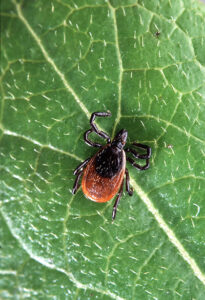UMaine part of New England Center of Excellence in Vector-Borne Diseases

The University of Maine has joined a consortium of seven universities in the region to form the New England Center of Excellence in Vector-Borne Diseases (NEWVEC). The project received a $10 million five-year award from the Centers for Disease Control and Prevention (CDC), $694,363 of which was awarded to UMaine.
Allison Gardner, assistant professor of arthropod vector biology at the School of Biology and Ecology and Mitchell Center Faculty Fellow, is a co-principal investigator of the project and the lead investigator for Maine.
“As we all know well from the COVID-19 pandemic, pathogens ignore borders so there is a need for coordination of research and vector control throughout the region,” Gardner says. “The six New England states have among the highest Lyme disease human case rates per capita in the country, and several new pathogens and invasive tick and mosquito species are on the rise. The center will be the first multistate effort with a New England focus to develop new strategies and tools to manage the growing vector-borne disease burden in the region.”
UMaine part of New England Center of Excellence in Vector-Borne Diseases
